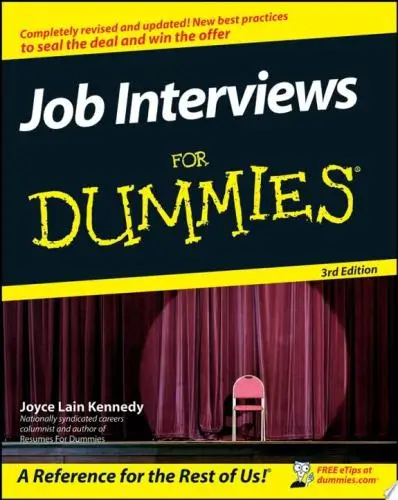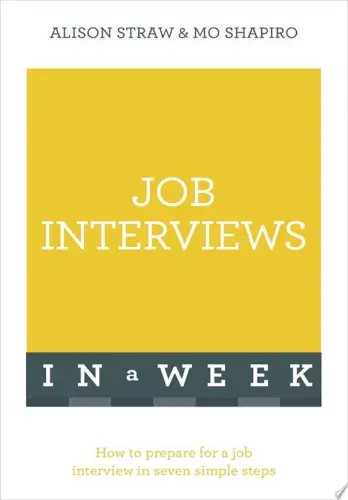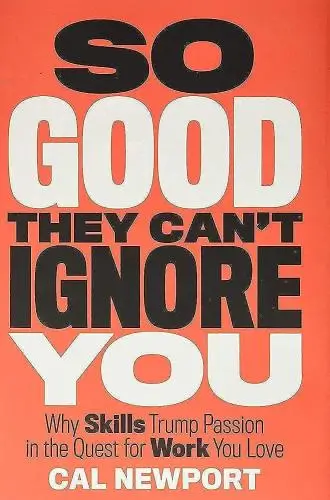So Good They Can't Ignore You
Why Skills Trump Passion in the Quest for Work You Love
What's it about?
So Good They Can't Ignore You challenges the conventional wisdom of "following your passion" when it comes to choosing a career. Newport argues that passion is not enough to guarantee success and instead advocates for developing rare and valuable skills through deliberate practice. By focusing on becoming excellent at what you do, you can create a fulfilling and successful career that others can't ignore.
About the Author
Cal Newport is a computer science professor, author, and productivity expert. He is renowned for his books on career success and deep work, such as "Deep Work: Rules for Focused Success in a Distracted World" and "So Good They Can't Ignore You." Newport's work emphasizes the importance of concentrated, uninterrupted work to achieve high productivity and professional fulfillment. He advocates for deliberate practice, cultivating valuable skills, and avoiding the trap of shallow work. Newport's insights have gained significant attention in the modern workplace, making him a sought-after authority on productivity and success.
10 Key Ideas of So Good They Can't Ignore You
Adopt the Craftsman Mindset: Focus on What You Can Offer the World
Instead of obsessing over discovering your passion, concentrate on honing your skills and mastering your craft.
The craftsman mindset emphasizes the importance of offering value through your work.
By focusing on what you can contribute rather than what you can get from a job, you develop a strong work ethic and a commitment to excellence.
This approach leads to the acquisition of rare and valuable skills, which in turn makes you indispensable.
Learn DeeperIdentify Your Core Skills: Start by making a list of the skills you currently possess. These can be related to your job, hobbies, or even general life skills. Once identified, rank them based on your proficiency.
Set Skill Improvement Goals: For each skill, set specific, measurable, achievable, relevant, and time-bound (SMART) goals for improvement. This could involve taking online courses, practicing daily, or seeking mentorship.
Seek Feedback Regularly: Don’t work in a vacuum. Ask for feedback from peers, supervisors, or mentors on your work. Use this feedback to make targeted improvements.
Document Your Progress: Keep a journal or log of your skill development journey. Note down what you learn, challenges you face, and how you overcome them. This will not only track your progress but also highlight your dedication and growth.
Contribute to Projects or Communities: Look for opportunities to apply your skills in real-world projects or by contributing to communities. This could be through volunteer work, freelancing, or participating in forums related to your field.
- Example
A graphic designer decides to master the use of a new design software. They start by watching tutorial videos, practicing daily by recreating various designs, and then volunteering to create graphics for a local non-profit organization to apply their new skills.
- Example
A software developer wants to improve their coding efficiency. They identify that they need to get better at a specific programming language. They set a goal to complete an advanced coding challenge in 60 days, practice coding problems every day, seek feedback from more experienced developers, and document their learning and problem-solving strategies.
Embrace the Power of Stretch and Destroy: Push Beyond Your Comfort Zone
Growth occurs at the edge of your comfort zone.
To improve and acquire new skills, you must engage in tasks that stretch your abilities and sometimes even lead to failure.
This concept, known as 'deliberate practice,' involves tackling challenges that are just beyond your current level of competence, thereby forcing you to expand your capabilities.
It's a rigorous process but essential for achieving mastery and becoming so good they can't ignore you.
Learn DeeperSet Stretch Goals: Identify areas in your life or career where you want to improve. Create specific, challenging goals that are slightly out of reach. For example, if you're a writer, aim to write a genre you've never tried before or submit your work to a prestigious publication.
Embrace Failure as a Learning Tool: Understand that failure is not the opposite of success but a stepping stone towards it. When you fail at a stretch task, analyze what went wrong and what you can learn from it. This mindset shift turns every failure into a valuable lesson.
Seek Feedback: Regularly ask for constructive criticism from peers, mentors, or experts in your field. Feedback is crucial for identifying weaknesses and areas for improvement that you might not see on your own.
Dedicate Time for Deliberate Practice: Allocate specific times in your schedule for deliberate practice. This could mean setting aside an hour each day to work on a challenging project or skill. The key is consistency and focused effort.
Track Your Progress: Keep a journal or log of your activities related to stretch tasks. Note what you did, how it felt, what was difficult, and any progress you observe. This will help you see your growth over time and keep you motivated.
- Example
A graphic designer who primarily works with digital media decides to stretch their skills by taking on a project that involves hand-drawn illustrations, something they're not as comfortable with. They dedicate a few hours each week to practice drawing by hand, seek feedback from colleagues skilled in illustration, and gradually incorporate hand-drawn elements into their digital work.
- Example
A software developer who is proficient in back-end development sets a goal to learn front-end development to become a full-stack developer. They start by taking online courses, then apply their new skills by building small projects that require both front-end and back-end work. They regularly attend meetups and code reviews to get feedback and tips from more experienced full-stack developers.
Seek Constant Feedback: The Key to Rapid Improvement
Feedback is crucial for identifying areas of improvement and accelerating your learning curve.
Without it, you're working in the dark.
Make a habit of seeking constructive criticism from peers, mentors, or anyone with relevant expertise.
This will help you understand your weaknesses and strengths, allowing you to focus your efforts more effectively on areas that need development.
Embracing feedback, even when it's tough, propels you towards excellence.
Learn DeeperAsk for Feedback Regularly: Make it a habit to ask for feedback after completing tasks or projects. This could be from your boss, colleagues, or clients. Don't wait for annual reviews; seek out opportunities to learn how you can improve on a regular basis.
Create a Feedback Loop: After receiving feedback, take actionable steps to implement the advice you've been given. Then, circle back to those who provided the feedback to show them how you've applied their suggestions and ask for further feedback on the changes you've made.
Embrace Negative Feedback: Understand that negative feedback is not a personal attack but an opportunity for growth. Approach it with an open mind and a willingness to learn. Ask clarifying questions if the feedback isn't clear, so you can make precise improvements.
Set Specific Goals Based on Feedback: Use the feedback to set specific, measurable goals for improvement. For example, if you're told you need to improve your presentation skills, set a goal to attend a public speaking workshop and practice your skills in smaller group settings before presenting again.
- Example
After a project presentation, Maria asks her team leader for specific feedback on her performance. The team leader suggests improving her data visualization skills for better clarity. Maria enrolls in an online course on data visualization, applies the new techniques in her next project, and then seeks feedback again to gauge her improvement.
- Example
John receives feedback from his mentor that his reports are often too detailed, making them difficult to digest. He decides to work on summarizing key points and asks a colleague to review his next report before submission. After implementing the changes, he asks his mentor to review a subsequent report to ensure the improvements align with the feedback.
Build a Mission: Have a Unifying Focus for Your Career
A compelling mission gives your work direction and purpose.
However, such missions often emerge from the mastery of your field, not before.
Once you've acquired significant skills and knowledge, look for ways to apply them in a manner that resonates with your personal values and aspirations.
This could mean starting a new project, changing the direction of your career, or leveraging your expertise to make a difference.
A clear mission motivates you and makes your work more fulfilling.
Learn DeeperIdentify Your Core Skills and Interests: Start by taking stock of what you're good at and what you enjoy doing. This could involve reflecting on past projects, feedback from colleagues, or even taking skill assessment tests.
Seek Mastery in Your Field: Dedicate time each day or week to improve your skills. This could be through formal education, online courses, or self-study. The goal is to become so good they can't ignore you.
Explore the Needs of Your Field: Look for gaps or unmet needs within your industry that align with your skills and interests. This could involve talking to mentors, attending industry conferences, or staying updated with industry news.
Develop a Personal Mission Statement: Based on your skills, interests, and the needs you've identified, craft a mission statement that guides your career decisions. This should reflect your personal values and how you want to make a difference.
Implement Small Projects or Initiatives: Start small by initiating projects or tasks that align with your mission. This could be within your current job or as a side project. Use these as opportunities to apply your skills in meaningful ways.
Network with Purpose: Connect with individuals who share your interests or are influential in areas you care about. Networking can provide support, inspiration, and open doors to opportunities aligned with your mission.
- Example
A software developer passionate about environmental sustainability might master green coding practices and then launch an initiative within their company to optimize software for energy efficiency.
- Example
A marketing professional with a knack for storytelling and a passion for education reform could focus on mastering digital marketing skills and then volunteer or work on campaigns for educational nonprofits or ed-tech startups.
Turn Down a Promotion: Prioritize Learning Over Immediate Rewards
Counterintuitive as it may seem, sometimes the best way to advance your career is to turn down opportunities that don't align with your long-term goals.
If a promotion or new job doesn't offer the chance to learn new skills or deepen existing ones, it might be a step back in disguise.
Prioritizing opportunities that challenge you and contribute to your growth ensures that you're building a career that's not just successful but also meaningful and satisfying.
Learn DeeperEvaluate Your Long-Term Goals Regularly: Set aside time every few months to reflect on your career path. Are you moving in the direction you want? What skills do you need to develop to reach your goals?
Research Before You Leap: Before accepting any promotion or new job offer, thoroughly investigate what the position entails. Will it allow you to grow in areas that matter to you? If not, it might be worth passing.
Seek Out Mentors: Find individuals who are where you want to be in your career. Ask them about their paths and what kinds of opportunities they prioritized. Their insights can guide your decisions.
Create a Learning Plan: For each job or role you consider, outline what new skills or knowledge you hope to gain. Use this as a criterion for evaluating the opportunity's alignment with your career goals.
Be Open About Your Goals: When discussing career advancement with your employer, be clear about what you're looking for in terms of growth and learning. Sometimes, they can offer alternatives that better suit your aspirations.
- Example
A software developer is offered a managerial position but turns it down because it would mean less coding and learning new technologies, which are crucial for her goal of becoming a lead developer in cutting-edge projects.
- Example
An accountant is presented with an opportunity to move into a higher-paying role in another department but declines because the new position wouldn't offer any new types of accounting work or exposure to international finance, which he is keen to learn to advance his career globally.
Deeper knowledge. Personal growth. Unlocked.
Unlock this book's key ideas and 15M+ more. Learn with quick, impactful summaries.
Read Full SummarySign up and read for free!
So Good They Can't Ignore You Summary: Common Questions
Experience Personalized Book Summaries, Today!
Discover a new way to gain knowledge, and save time.
Sign up for our 7-day trial now.
No Credit Card Needed

Similar Books

The Decision Book
Mikael Krogerus
This is Going to Hurt
Adam Kay
The ^AOxford Handbook of Job Loss and Job Search
Ute-Christine Klehe PhD
Job Interviews For Dummies®
Joyce Lain Kennedy
Job Interviews In A Week
Alison Straw
Handbook of Career Development
Gideon Arulmani
The Company She Keeps
Georgia Durante
The Millionaire Fastlane
MJ DeMarco
Losing My Virginity
Richard Branson
Crush It!
Gary VaynerchukTrending Summaries

Peak
Anders Ericsson
Never Split the Difference
Chris Voss
Smart Brevity
Jim VandeHei
The Psychology of Money
Morgan Housel
The First 90 Days
Michael D. Watkins
Atomic Habits
James Clear
Thinking, Fast and Slow
Daniel Kahneman
The Body Keeps the Score
Bessel van der Kolk M.D.
The Power of Regret
Daniel H. Pink
The Compound Effect
Darren HardyNew Books

The White Night of St. Petersburg
Michel (Prince of Greece)
Demystifying Climate Models
Andrew Gettelman
The Hobbit
J.R.R. Tolkien
The Decision Book
Mikael Krogerus
The Decision Book: 50 Models for Strategic Thinking
Mikael Krogerus
Fichte
Johann Gottlieb Fichte
Do No Harm
Henry Marsh
This is Going to Hurt
Adam Kay
This Is Your Brain on Joy
Earl Henslin

